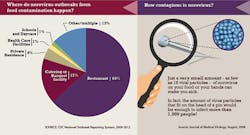I had an eventful holiday season. I went to three different houses, visited my family and watched as many of them came down with the stomach flu.
The issue began with my niece two days before Christmas Eve. Usually bubbly and charismatic, she was confined to her bed. Sparing the details, my mother took care of her, cleaning up the mess and making sure she had plenty of fluids.
Fast forward to Christmas Eve and Christmas. My mother stayed at home, having contracted the same thing my niece had. In the days that followed, my husband, stepdad, father, brother-in-law, nephew and stepsister seemingly all came down with the exact same strand, experiencing similar symptoms and signs.
All of the aforementioned family members had been in contact with my niece at some point either on Christmas Eve or Christmas day.
Luckily, I was able to avoid it and spent time vigorously disinfecting my house.
The stomach flu, also known as the norovirus or acute gastroenteritis, is an ornery little virus that contributes to 19 to 21 million illnesses, 56,000 to 71,000 hospitalizations and 570 to 800 deaths in the United States each year, according to the Centers for Disease Control and Prevention.
Unlike your traditional flu, the norovirus causes stomach inflammation, and annual shots only protect against the respiratory variety.
It also is incredibly easy to contract. Research shows the virus can live on certain surfaces for weeks. Some ways to contract the stomach flu include:
- Eating food or drinking liquids that are contaminated.
- Touching surfaces or objects and then putting your hand or fingers in your mouth.
- Direct contact with a person who is infected.
- While many of these recommendations stem from households with children, these same things translate to the workplace as well.
A National Health Interview Survey found the flu contributes to 200 million days of lost productivity and 75 million days of missed work. While this doesn't break out respiratory forms from the norovirus, one thing is for certain: if you are showing any symptoms, you should stay home from work.
Based on CDC data from 2010, more than one in four employees worked while ill with H1N1 during the 2009 H1N1 pandemic, resulting in the estimated infection of 7 million co-workers with H1N1.
With more than 80 percent of infections spread through hand contact and the easy transmission of the norovirus (See Infographic), the recipe for an outbreak at work is as easy as pie.
Lisa Delaney, National Institute for Occupational Safety and Health associate director, emergency preparedness and response, provided insight about communicable diseases and pandemics to attendees at the National Safety Congress and Expo in October 2016.
She said there are three areas on which employers should focus on: protecting employee health, keeping the business in operation and assuring function of the surrounding community.
Aside from encouraging vaccination, employers can help prevent flu or communicable disease transmission if they:
- Send sick employees home.
- Emphasize respiratory etiquette and hand hygiene.
- Perform routine environmental cleaning.
Increase social distancing or rotate hours during peak flu season to reduce transmission.
In addition, if you are no longer experiencing symptoms, you still might be contagious. Annie Pryor, author of StoptheStomachFlu.com and Ph.D in biochemistry, writes on her website that a person who has the stomach flu still can be contagious for at least three days after their symptoms have stopped.
Whether or not my niece was "Patient Zero" in my family cannot be proven despite the timing of the family outbreak. My mother commented that everyone at her workplace was sick as well.
Still, the fact remains that staying at home when you're experiencing symptoms – whether it's cold, the flu or some other illness – is the best course of action. Not only could you prolong your recovery by not getting proper rest, you also could cause lost work days across the company and productivity could suffer as a result.
So, do everyone a favor and stay home.

